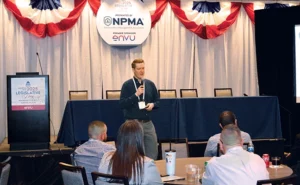The National Pest Management Association (NPMA) held its annual Legislative Day event March 9-11 in Washington, D.C. Pest management professionals (PMPs) met with legislators on Capitol Hill to advocate for the pest management industry.

This year, they focused on four issues:
1. Pesticide preemption
PMPs asked legislators to support the inclusion of pesticide preemption in the 2025 Farm Bill — a package of legislation primarily related to agriculture, food and farming — to ensure pesticides continue to be regulated by scientific experts. If included, each state would give one state agency the authority to regulate pesticide sales, distribution and use. It would not allow local pesticide regulation.
“Our members have consistently advocated for regulatory certainty over the past decade,” says J.D. Darr, NPMA’s senior director of legislative and regulatory affairs. “We’ve seen strong support from Congress, with our language included in the House version of the 2018 Farm Bill and again in last year’s House Bill, which passed through Committee with bipartisan support. Through our members’ advocacy during Legislative Day, we reinforced that message with congressional members.”
2. Rodenticides
The U.S. Environmental Protection Agency (EPA) currently is reviewing rodenticides, a process it is required to undertake every 15 years. As PMPs wait for the EPA’s amended proposed interim decision, the concern is that rodenticides may be reclassified as restricted-use pesticides (RUPs) to reduce their impact on endangered species. PMPs asked for support in maintaining access to reliable, effective rodent control solutions.
“NPMA members are committed to protecting human health, and pest management professionals work diligently to be good stewards of EPA-approved products while effectively controlling rodent populations,” adds Darr. “Engaging congressional offices on the role of rodenticides helps ensure the final registration decisions support both environmental protection and the ability to keep rats and mice from spreading disease.”
3. Global malaria control
The President’s Malaria Initiative has been key in the fight against malaria since its launch by President George W. Bush in 2005. This program, which each successive president has continued, aims to control and eliminate malaria worldwide.
As protectors of public health, PMPs know it is critical to help eliminate mosquito-borne diseases that may affect Americans who travel, work and serve in countries where malaria is prevalent. They asked legislators to support the President’s Malaria Initiative in the 2026 fiscal year appropriations process.
“To effectively manage pest-related health threats here at home, we must also support efforts to eliminate harmful diseases abroad,” Darr explains. “The U.S. has long played a leading role in malaria control and research. Through supporting funding for the President’s Malaria Initiative, the NPMA is proud to partner with the United Nations Foundation on its ‘United to Beat Malaria’ campaign.”
4. 25C tax credit
The Efficient Energy Home Improvement Tax Credit (25C) allows homeowners to receive tax credits for insulation treated with pesticide or insulation that must be replaced following a pest infestation. PMPs asked legislators to maintain the tax credit.
The NPMA’s stance is that the tax credit encourages homeowners to properly treat pest infestations, pursue energy-efficient upgrades and prioritize their health. Under the expansion of the program in the Inflation Reduction Act, homeowners can receive up to $1,200 in tax credits for insulation.
“NPMA members highlighted the connection between tax credits and homeowners’ ability to address pest damage while pursuing energy-efficient home improvements,” Darr notes. “Upgrades such as installing or replacing insulation with new pesticide-treated insulation are both attainable and affordable under the 25C Tax Credit program.”
The next Legislative Day event will take place March 15-17, 2026.
Leave A Comment